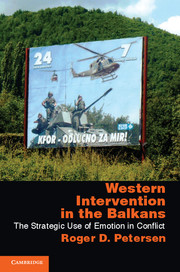Book contents
- Frontmatter
- Contents
- Acknowledgments
- Part 1 Background and Theory
- 1 Western Intervention in the Balkans
- 2 Emotions as Resources
- 3 The Strategic Use of Emotions, I
- 4 Intervention Games
- 5 The Strategic Use of Emotions, II
- 6 The Strategic Use of Emotions, III
- Part 2 Cases and Tests
- Appendix A A Note on Names
- Appendix B Alternative Arguments
- References
- Index
- References
1 - Western Intervention in the Balkans
The Strategic Use of Emotion in Ethnic Conflict
from Part 1 - Background and Theory
Published online by Cambridge University Press: 05 June 2012
- Frontmatter
- Contents
- Acknowledgments
- Part 1 Background and Theory
- 1 Western Intervention in the Balkans
- 2 Emotions as Resources
- 3 The Strategic Use of Emotions, I
- 4 Intervention Games
- 5 The Strategic Use of Emotions, II
- 6 The Strategic Use of Emotions, III
- Part 2 Cases and Tests
- Appendix A A Note on Names
- Appendix B Alternative Arguments
- References
- Index
- References
Summary
In this book, I try to achieve multiple but connected goals. First, I wish to provide a history of ethnic conflict in the Western Balkans since the breakup of Yugoslavia. This goal is the book's substantive agenda. This history will concentrate on the role of the West, in particular the West's intervention policies. There is considerable variation in the success and failure of these policies. Understanding this variation requires some innovation in method. My second goal is to supply this innovation. This goal is the book's methodological agenda. This book has a third, less direct, aim. I hope that by developing this methodology and applying and testing it on the universe of Western Balkan cases, I will also be able to provide some understanding of Western intervention policy more broadly.
The substantive agenda
At its broadest level, this book concentrates on explaining variation in the success or failure of Western intervention in the Balkans from the collapse of communism up to the summer of 2008. With the formation of a strongly pro-EU government in Serbia in the summer of 2008, significant opposition to incorporation into Western institutions and the Western economy disappeared from the region. Not to exaggerate, but in an important sense one type of history had ended in the Balkans. Across this poor and corrupt region, nearly all looked to embrace the democracy and capitalism of the European Union and the United States. No party or leader could offer a coherent alternative. This transformation was perhaps inevitable. The combined gross domestic product of the entire Western Balkans (usually defined as the former Yugoslavia minus Slovenia but plus Albania) was dwarfed by that of its Western neighbors. In an era of globalization, these poor states could not advance outside of Europe's orbit. To be sure, significant conflicts and disputes still color the Western Balkan terrain, especially in Kosovo, Bosnia, and Macedonia. This book will chronicle the ways those conflicts are still being contested. Yet the era of massive violence and isolation appears to be over.
- Type
- Chapter
- Information
- Western Intervention in the BalkansThe Strategic Use of Emotion in Conflict, pp. 3 - 22Publisher: Cambridge University PressPrint publication year: 2011



